Every C ++ programmer should be able to find memory leaks. C ++ is a complex language, making mistakes is easy, and finding them can be a chore. This is especially true for memory leaks. The situation with catching memory leaks only gets worse if the Qt library is used in the C ++ code.
This article is devoted to various tools that can be used with varying degrees of success to catch memory leaks in C ++ / Qt applications (desktop). The tools will be reviewed in conjunction with the Visual Studio 2019 IDE. This article will not cover all possible tools, but only the most popular and effective ones.
Our team has been studying such tools for a long time and closely and uses them in their work. The amount of code on which it is possible to test such tools is about 1.5 million lines. Based on our great practical experience, we will tell you about the pros and cons of different tools, tell you what they are able to find and what is too tough, talk about unobvious nuances and, most importantly, draw up a summary comparative table based on a real example. We will try to bring you up to date as quickly and simply as possible (show a quick start), so even if you, the reader, have never looked for memory leaks, this article will help you figure out and find your first leak in a couple of hours. Go!
What is the problem?
A memory leak is a situation when memory was allocated (for example, by the new operator) and was not mistakenly deleted by the corresponding delete operator / function (for example, delete).
Example 1.
int* array = nullptr;
for (int i = 0; i < 5; i++)
{
array = new int[10];
}
delete[] array;
There is a leak here when allocating memory for the first 4 arrays. 160 bytes are leaked. The last array is removed correctly. So, the leak is strictly on one line:
array = new int[10];
Example 2.
class Test
{
public:
Test()
{
a = new int[100];
b = new int[300];
}
~Test()
{
delete[] a;
delete[] b;
}
private:
int* a;
int* b;
};
int main()
{
Test* test = new Test;
return 0;
}
There are already more leaks here: the memory for a (400 bytes), for b (1200 bytes) and for test (16 bytes for x64) is not deleted. However, the removal of a and b is provided in the code, but it does not happen due to the absence of a call to the Test destructor. Thus, there are three leaks, but the error that leads to these leaks is only one, and it is generated by the line
Test* test = new Test;
At the same time, there are no errors in the code of the Test class.
Example 3.
Let's have a Qt class, something like this:
class InfoRectangle : public QLabel
{
Q_OBJECT
public:
InfoRectangle(QWidget* parent = nullptr);
private slots:
void setInfoTextDelayed();
private:
QTimer* _textSetTimer;
};
InfoRectangle::InfoRectangle(QWidget* parent)
: QLabel(parent)
{
_textSetTimer = new QTimer(this);
_textSetTimer->setInterval(50);
connect(_textSetTimer, &QTimer::timeout, this, &InfoRectangle::setInfoTextDelayed);
}
void InfoRectangle::setInfoTextDelayed()
{
// do anything
setVisible(true);
}
Let's also have memory allocation somewhere in the code:
InfoRectangle* rectangle = new InfoRectangle();
, delete? , Qt. , , :
mnuLayout->addWidget(rectangle);
rectangle->setParent(this);
– . , : , . – InfoRectangle
. – QTimer,
_textSetTimer
Qt. , – connect
.
, new :
template <typename Func1, typename Func2>
static inline QMetaObject::Connection connect(
const typename QtPrivate::FunctionPointer<Func1>::Object *sender, Func1 signal,
const typename QtPrivate::FunctionPointer<Func2>::Object *receiver, Func2 slot,
Qt::ConnectionType type = Qt::AutoConnection)
{
typedef QtPrivate::FunctionPointer<Func1> SignalType;
typedef QtPrivate::FunctionPointer<Func2> SlotType;
const int *types = nullptr;
if (type == Qt::QueuedConnection || type == Qt::BlockingQueuedConnection)
types = QtPrivate::ConnectionTypes<typename SignalType::Arguments>::types();
return connectImpl(sender, reinterpret_cast<void **>(&signal),
receiver, reinterpret_cast<void **>(&slot),
new QtPrivate::QSlotObject<Func2, typename QtPrivate::List_Left<
typename SignalType::Arguments, SlotType::ArgumentCount>::Value,
typename SignalType::ReturnType>(slot),
type, types, &SignalType::Object::staticMetaObject);
}
, . , . , Qt, connect, Qt, , , .
: , . . – , , , , , ( ). , . , , .
, , , ? …
– , , , . . , . , . , () . , , .
|
|
|
|
|
- |
|
|
1.5 |
: , 1, 2, , |
|
7 |
253 |
1. .
, .
Intel Inspector
Intel Inspector – , Visual Studio . Intel Inspector , , , .
Intel Inspector Intel Parallel Studio 2019, Intel Inspector, . Visual Studio 2019 Intel Parallel Studio. , Intel Inspector Visual Studio (. 1).
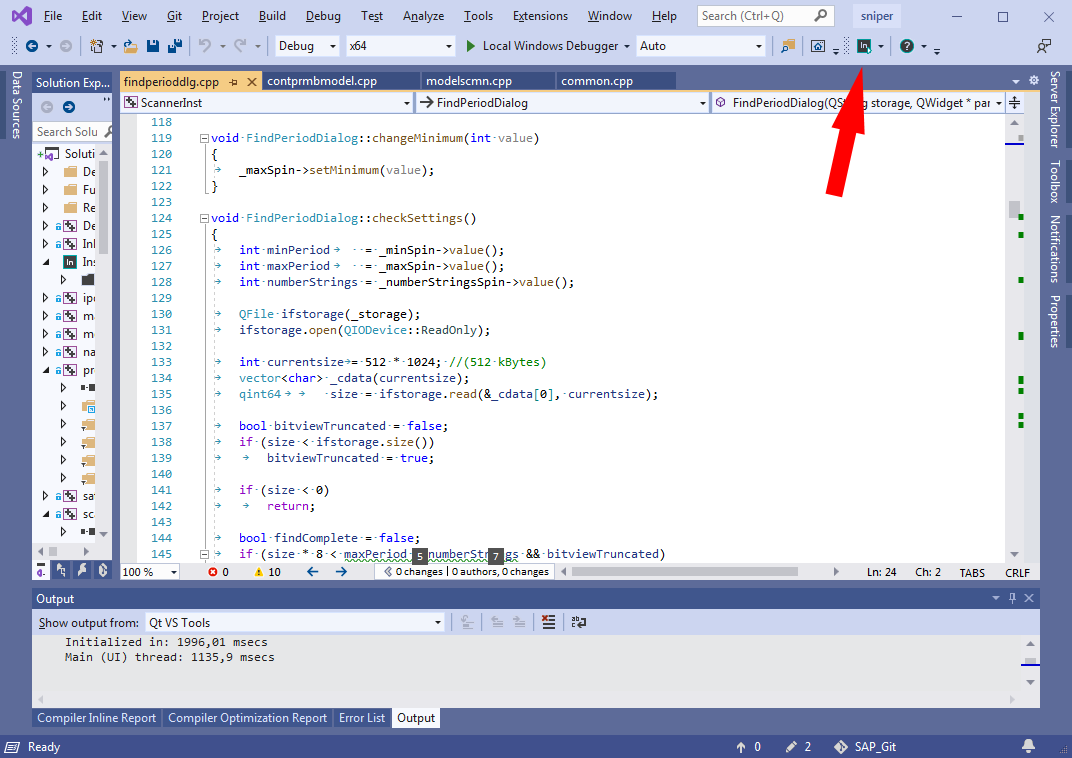
Intel Inspector’ , - «Intel Inspector».
- Intel Inspector . «Detect Leaks» , (. 2). - , , , , .
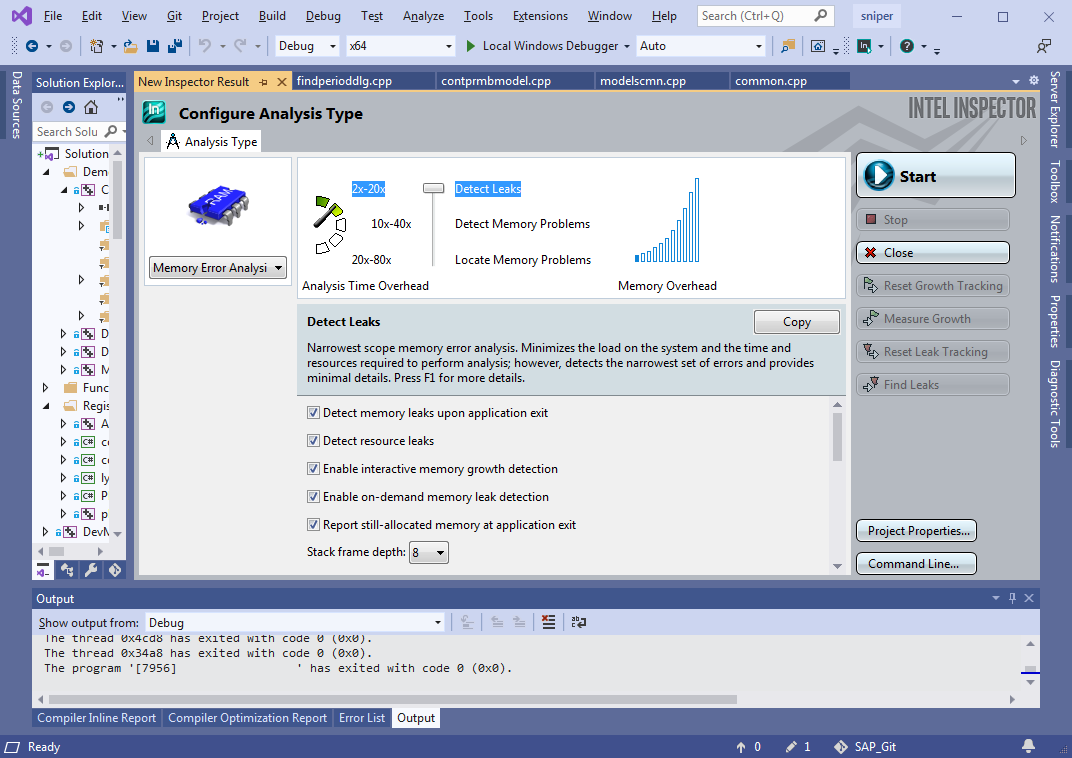
«Start», . , ( , «» ), . , , . , . , (. . 1). , Intel Inspector (. 3):
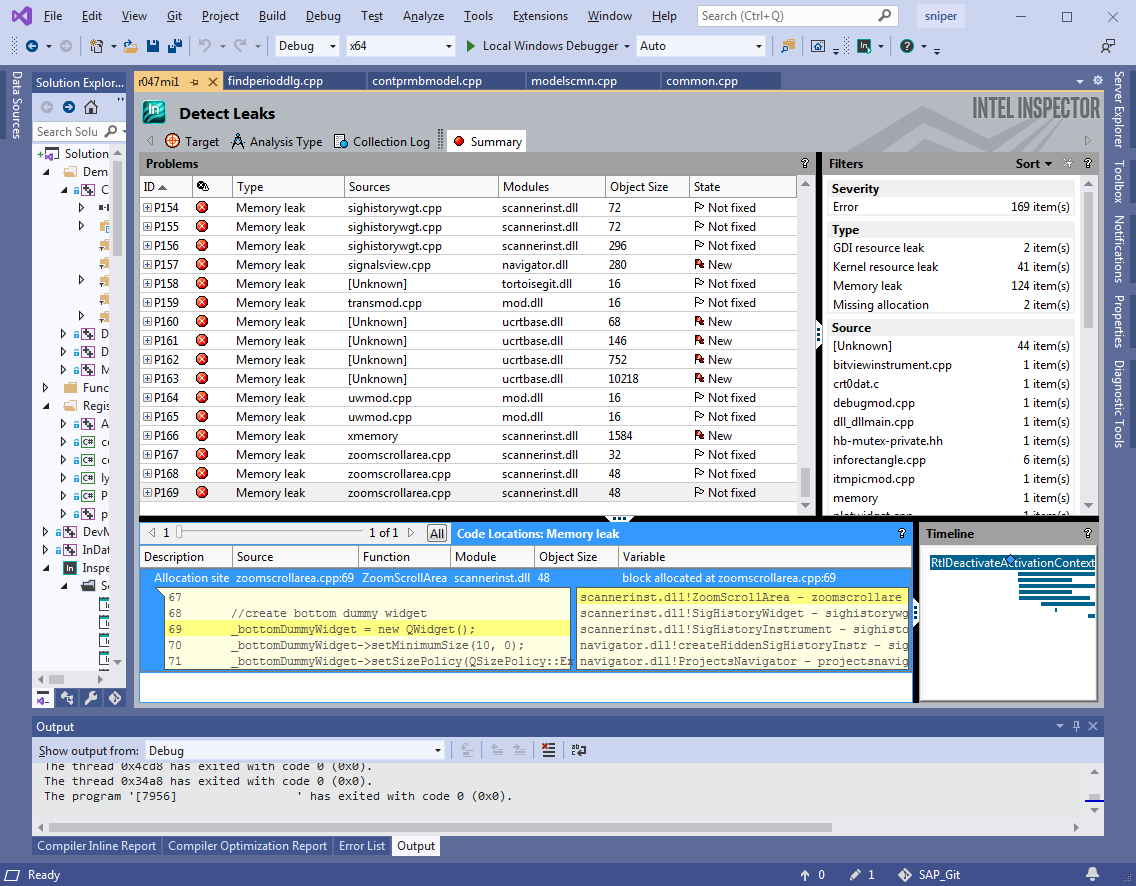
, , , call-stack . , . . – IDE!
, . debug , release . ++- , debug , release ( 20 ), debug' . – release (, ), . Intel Inspector' , . , release , .
: Intel Inspector ( ) , debug release. (. 1).
|
|
, |
|
|
|
|
||
Release c |
10 |
70 |
7 |
Debug |
101 |
973 |
9,6 |
2. Intel Inspector`
, . . , , , , , , 10 . ( debug), 100 . ( , ) .
– ? ? , Intel Inspector`?
|
|
- : n |
|
: r |
: (n-r)/n |
: N/n |
||
: N |
|
|
|||||
Release c |
7 |
192 |
168 |
24 |
0 |
1 (100%) |
27 |
Debug |
7 |
129 |
107 |
22 |
0 |
1 (100%) |
18 |
3. Intel Inspector
, Intel Inspector . , . . , Intel Inspector, , , , , «» ( 2 3, . ).
, Intel Inspector , – . , , release , debug. , , – , .
.
1. dll.
Intel Inspector dll, . , .
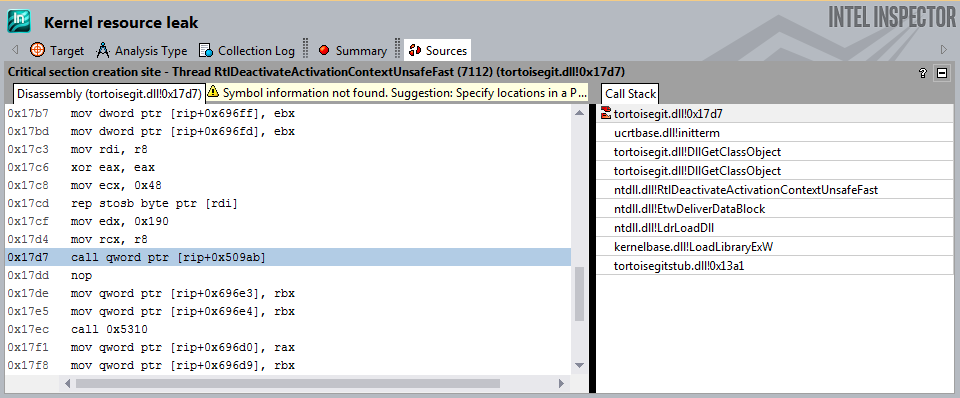
2. aligned_malloc
.
m_pVitData = (VITDEC_DATA*)_aligned_malloc(sizeof(VITDEC_DATA), 16);
m_pDcsnBuf = (byte*)_aligned_malloc(64 * (VITM6_BUF_LEN + VITM6_MAX_WND_LEN), 16);
...
_aligned_free(m_pDcsnBuf);
_aligned_free(m_pVitData);
, "" release, debug .
3. Pragma.
#pragma omp parallel for schedule(dynamic)
for (int portion = 0; portion < portionsToProcess; ++portion)
{
…
}
#pragma
!
, - ( Intel Inspector, VS, ..) , – . , (<50000 ) Intel Inspector . – , .
Intel Inspector – , ( ), . release , ( , ), debug. debug .
, Intel Inspector . , , . , «» Intel Inspector, , «» .
Visual Leak Detector
Visual Leak Detector ( VLD) – , Output (IDE Visual Studio 2019) .
, Visual Studio .
VLD VLD, , , .. .
VLD ( vld-2.5.1-setup.exe) , ( Path Visual Studio). .
VLD dll- Visual Studio 2019, dbghelp.dll
C:\Program Files (x86)\Microsoft Visual Studio\2019\Enterprise\Common7\IDE\Extensions\TestPlatform\Extensions\Cpp\x64
C:\Program Files (x86)\Visual Leak Detector\bin\Win64
.
:
#pragma once //#define LEAKS_DETECTION #ifdef LEAKS_DETECTION #include <vld.h> #endif
, , .
(pp) . , solution.
#define LEAKS_DETECTION
solution. (F5) , . debug. Release c .
VLD Output. , call-stack , .
, VLD
---------- Block 652047 at 0x0000000027760070: 8787200 bytes ----------
Leak Hash: 0x02B5C300, Count: 1, Total 8787200 bytes
Call Stack (TID 30996):
ucrtbased.dll!malloc()
d:\agent\_work\63\s\src\vctools\crt\vcstartup\src\heap\new_array.cpp (29): SniperCore.dll!operator new[]()
D:\SOURCE\SAP_Git\sap_win64\core\alg\fbg\ddec\S2Ldfg.cpp (445): SniperCore.dll!CS2Ldfg::CreateLLRTbls() + 0xD bytes
D:\SOURCE\SAP_Git\sap_win64\core\alg\fbg\ddec\S2Ldfg.cpp (217): SniperCore.dll!CS2Ldfg::SetModeEB()
D:\SOURCE\SAP_Git\sap_win64\core\alg\fbg\ddec\S2Ldfg.cpp (1447): SniperCore.dll!CS2Ldfg::Set() + 0xA bytes
D:\SOURCE\SAP_Git\sap_win64\core\alg\fbg\ddec\ddec.cpp (509): SniperCore.dll!DFBase::instanceS2Dec()
D:\SOURCE\SAP_Git\sap_win64\core\alg\fbg\ddec\ddec.cpp (58): SniperCore.dll!DFBase::DFBase() + 0xF bytes
D:\SOURCE\SAP_Git\sap_win64\core\alg\fbg\ddec\ddec.cpp (514): SniperCore.dll!DgbS5FecAnlzr::DgbS5FecAnlzr() + 0xA bytes
D:\SOURCE\SAP_Git\sap_win64\core\alg\fbg\fbganalyser.cpp (45): SniperCore.dll!TechnicalLayer::FBGAnalyser::FBGAnalyser() + 0x21 bytes
D:\SOURCE\SAP_Git\sap_win64\core\engine\handlers\fbganalysishandler.cpp (218): SniperCore.dll!TechnicalLayer::FBGAnalysisHandler::init() + 0x2A bytes
D:\SOURCE\SAP_Git\sap_win64\core\engine\handlers\fbganalysishandler.cpp (81): SniperCore.dll!TechnicalLayer::FBGAnalysisHandler::enqueueRequest()
D:\SOURCE\SAP_Git\sap_win64\core\engine\threadedhandler2.cpp (57): SniperCore.dll!TotalCore::ThreadedHandler2::run()
Qt5Cored.dll!QTextStream::realNumberPrecision() + 0x89E8E bytes
kernel32.dll!BaseThreadInitThunk() + 0xD bytes
ntdll.dll!RtlUserThreadStart() + 0x1D bytes
Data:
00 00 00 00 01 01 01 01 01 01 01 02 02 02 02 02 ........ ........
02 02 03 03 03 03 03 03 03 04 04 04 04 04 04 04 ........ ........
05 05 05 05 05 05 05 05 06 06 06 06 06 06 06 07 ........ ........
07 07 07 07 07 07 08 08 08 08 08 08 08 09 09 09 ........ ........
09 09 09 09 0A 0A 0A 0A 0A 0A 0A 0B 0B 0B 0B 0B ........ ........
0B 0B 0C 0C 0C 0C 0C 0C 0C 0D 0D 0D 0D 0D 0D 0D ........ ........
0E 0E 0E 0E 0E 0E 0E 0E 0F 0F 0F 0F 0F 0F 0F 10 ........ ........
10 10 10 10 10 10 11 11 11 11 11 11 11 12 12 12 ........ ........
EE EE EE EE EF EF EF EF EF EF EF F0 F0 F0 F0 F0 ........ ........
F0 F0 F1 F1 F1 F1 F1 F1 F1 F2 F2 F2 F2 F2 F2 F2 ........ ........
F3 F3 F3 F3 F3 F3 F3 F3 F4 F4 F4 F4 F4 F4 F4 F5 ........ ........
F5 F5 F5 F5 F5 F5 F6 F6 F6 F6 F6 F6 F6 F7 F7 F7 ........ ........
F7 F7 F7 F7 F8 F8 F8 F8 F8 F8 F8 F9 F9 F9 F9 F9 ........ ........
F9 F9 FA FA FA FA FA FA FA FB FB FB FB FB FB FB ........ ........
FC FC FC FC FC FC FC FC FD FD FD FD FD FD FD FE ........ ........
FE FE FE FE FE FE FF FF FF FF FF FF FF 00 00 00 ........ ........
---------- Block 2430410 at 0x000000002E535B70: 48 bytes ----------
Leak Hash: 0x7062B343, Count: 1, Total 48 bytes
Call Stack (TID 26748):
ucrtbased.dll!malloc()
d:\agent\_work\63\s\src\vctools\crt\vcstartup\src\heap\new_scalar.cpp (35): SniperCore.dll!operator new() + 0xA bytes
C:\Program Files (x86)\Microsoft Visual Studio\2019\Enterprise\VC\Tools\MSVC\14.28.29333\include\xmemory (78): SniperCore.dll!std::_Default_allocate_traits::_Allocate()
C:\Program Files (x86)\Microsoft Visual Studio\2019\Enterprise\VC\Tools\MSVC\14.28.29333\include\xmemory (206): SniperCore.dll!std::_Allocate<16,std::_Default_allocate_traits,0>() + 0xA bytes
C:\Program Files (x86)\Microsoft Visual Studio\2019\Enterprise\VC\Tools\MSVC\14.28.29333\include\xmemory (815): SniperCore.dll!std::allocator<TotalCore::TaskResult *>::allocate()
C:\Program Files (x86)\Microsoft Visual Studio\2019\Enterprise\VC\Tools\MSVC\14.28.29333\include\vector (744): SniperCore.dll!std::vector<TotalCore::TaskResult *,std::allocator<TotalCore::TaskResult *> >::_Emplace_reallocate<TotalCore::TaskResult * const &>() + 0xF bytes
C:\Program Files (x86)\Microsoft Visual Studio\2019\Enterprise\VC\Tools\MSVC\14.28.29333\include\vector (708): SniperCore.dll!std::vector<TotalCore::TaskResult *,std::allocator<TotalCore::TaskResult *> >::emplace_back<TotalCore::TaskResult * const &>() + 0x1F bytes
C:\Program Files (x86)\Microsoft Visual Studio\2019\Enterprise\VC\Tools\MSVC\14.28.29333\include\vector (718): SniperCore.dll!std::vector<TotalCore::TaskResult *,std::allocator<TotalCore::TaskResult *> >::push_back()
D:\SOURCE\SAP_Git\sap_win64\include\core\engine\task.h (119): SniperCore.dll!TotalCore::LongPeriodTask::setTmpResult()
D:\SOURCE\SAP_Git\sap_win64\include\core\engine\discretestephandler.h (95): SniperCore.dll!TotalCore::DiscreteStepHandler::setResult()
D:\SOURCE\SAP_Git\sap_win64\core\engine\handlers\prmbdtcthandler.cpp (760): SniperCore.dll!TechnicalLayer::PrmbDtctHandler::setContResult() + 0x1A bytes
D:\SOURCE\SAP_Git\sap_win64\core\engine\handlers\prmbdtcthandler.cpp (698): SniperCore.dll!TechnicalLayer::PrmbDtctHandler::processPortion()
D:\SOURCE\SAP_Git\sap_win64\core\engine\threadedhandler2.cpp (109): SniperCore.dll!TotalCore::ThreadedHandler2::tryProcess()
D:\SOURCE\SAP_Git\sap_win64\core\engine\threadedhandler2.cpp (66): SniperCore.dll!TotalCore::ThreadedHandler2::run()
Qt5Cored.dll!QTextStream::realNumberPrecision() + 0x89E8E bytes
kernel32.dll!BaseThreadInitThunk() + 0xD bytes
ntdll.dll!RtlUserThreadStart() + 0x1D bytes
Data:
10 03 51 05 00 00 00 00 B0 B4 85 09 00 00 00 00 ..Q..... ........
60 9D B9 08 00 00 00 00 D0 1B 24 06 00 00 00 00 `....... ..$.....
30 B5 4F 11 00 00 00 00 CD CD CD CD CD CD CD CD 0.O..... ........
:
Visual Leak Detector detected 383 memory leaks (253257876 bytes).
Largest number used: 555564062 bytes.
Total allocations: 2432386151 bytes.
Visual Leak Detector is now exiting.
, ,
No memory leaks detected.
Visual Leak Detector is now exiting.
debug : VLD . , release ( ) vld . . 4 release debug. (. . 1).
|
|
, |
, VLD, |
|
VLD |
VLD |
||
Debug |
101 |
172 |
1,7 |
Release c |
10 |
- |
- |
4. VLD
? ? , VLD?
|
|
- : n |
|
: r |
: (n-r)/n |
: N/n |
||
: N |
|
|
|||||
Debug |
7 |
185 |
185 |
0 |
0 |
1 (100%) |
26 |
5. VLD
, VLD . . , VLD, , , , , «» ( 2 3, . ). - , ( ), «». , , :
connect(arrowKeyHandler, &ArrowKeyHandler::upPressed,
[this] { selectNeighbourSignal(TopSide); });
, , , , connect (. 3). - .
, VLD , . continuous integration.
Visual Leak Detector – , ( ) . VLD , , , Intel Inspector debug. , «» , continuous integration.
. , vld . , , .
VS 2019
IDE Visual Studio 2019 – Diagnostic Tools. (snapshots). () . , , , .
( debug release c ). Diagnostic Tools. Memory Usage, Heap Profiling Take Snapshot.
, - , , . , , . , .
Break All , , , .
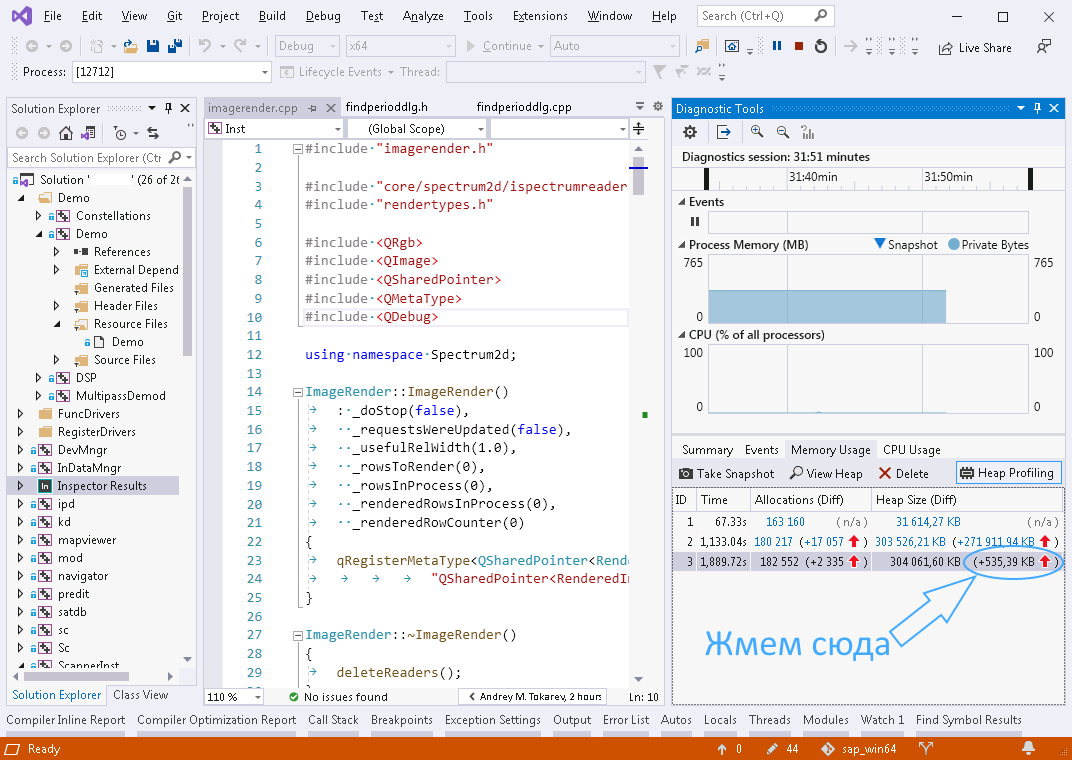
(. . 5, ). ViewMode -> Stacks View ( Types View), :
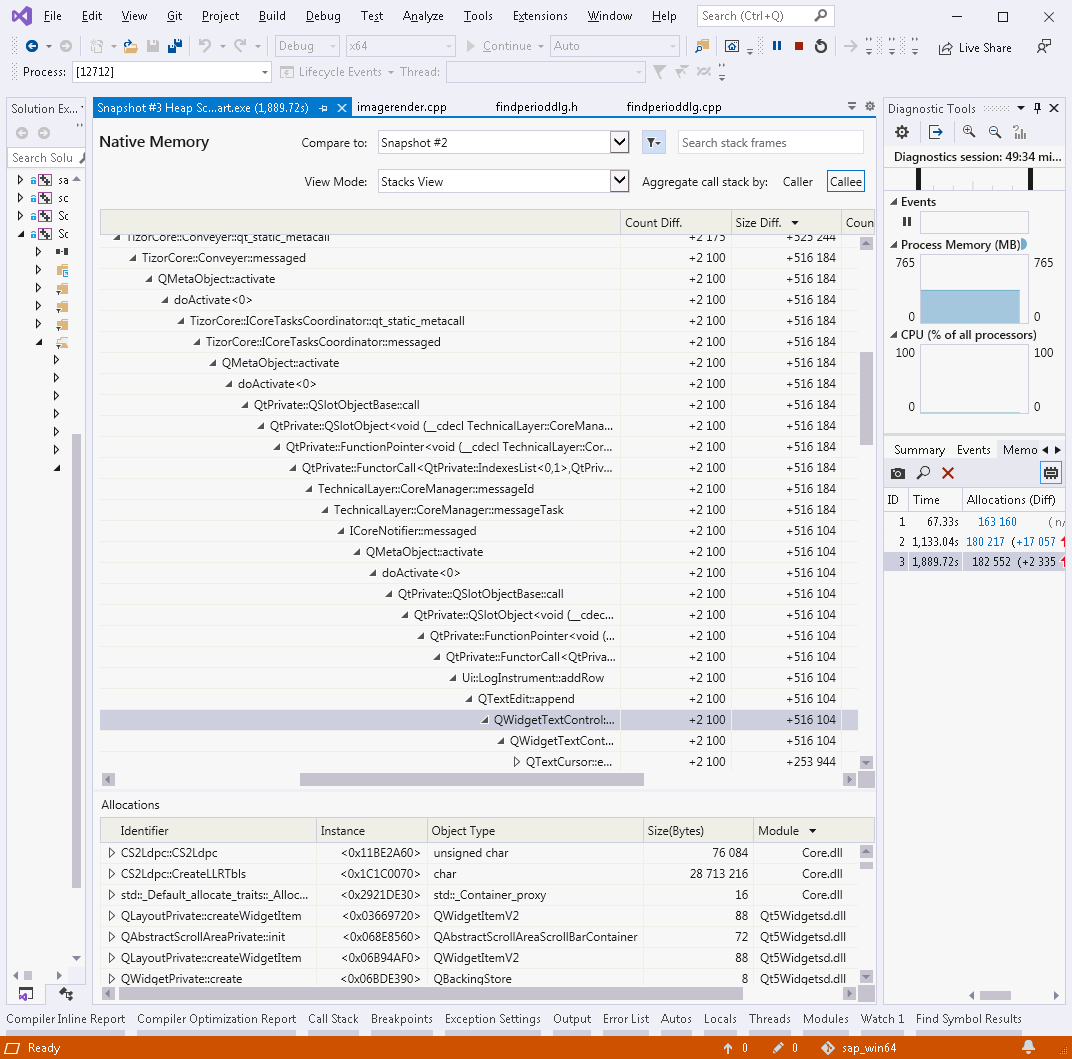
, Qt: , Qt. , . (. . 1), . , .
, (, ..). , , . ( ) .
PVS-Studio
, , - PVS-Studio. , . , solution. , «», .
. PVS-Studio Visual Studio 2019, «Extensions».
solution` Extensions->PVS-Studio->Check. «PVS-Studio» , «» High, Medium Low.
, , PVS-Studio . , , : V599, V680, V689, V701, V772, V773, V1005, V1023 ( . ).
Visual Studio Tools -> Options -> PVS-Studio «Detectable Errors (C++)» , ( «Hide All», ) – . 8. «Detectable Errors (C#)» ( «Hide All» «Disabled»).
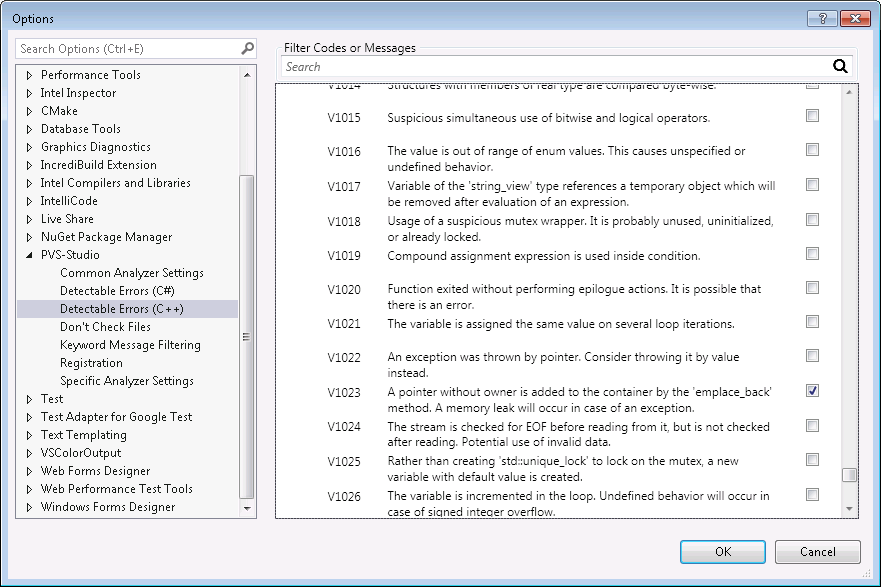
, , PVS-Studio High, Medium Low .
, , 1.5 2269 . Intel Core i7 4790K. (debug release) , ( , - , ).
|
- : n |
|
: r |
: (n-r)/n |
||
|
|
|
|
||||
30 |
7 |
2 |
0 |
2 |
7 |
0 % |
6. PVS-Studio
, - (Intel Inspector, VLD). , . , PVS-Studio .
, 2 – Intel Inspector Visual Leak Detector. :
|
|
Intel Inspector |
VLD |
|
|
|
|
|
|
() |
|
|
|
|
|
debug |
9.6 |
1,7 |
release |
7 |
- |
Does it find real leaks in debug |
Yes all. Redundancy of results - 18 times. |
Yes all. Redundancy of results - 26 times. |
Does it find real leaks in release with debug info |
Yes all. Redundancy of results - 27 times. |
- |
Debug false positives |
Yes a little |
Not |
False positives in release with debug info |
Yes a little |
- |
Can I use in Continuous Integration |
Not |
Yes |
Table7. Comparison of Intel Inspector and VLD.
It is advisable to give place No. 1 in the rating to VLD, since it does not give false positives, is more stable in operation and is more suitable for use in continuous integration scenarios.